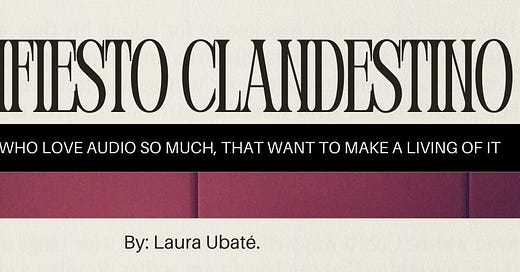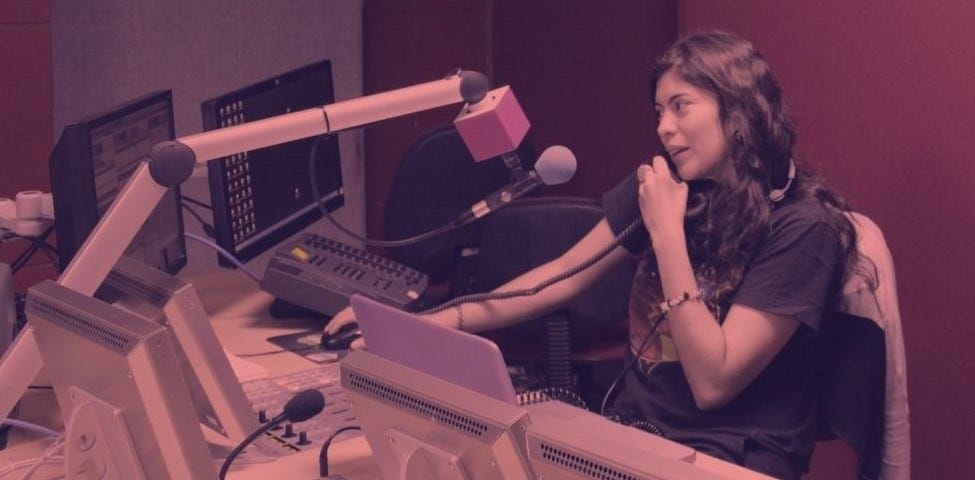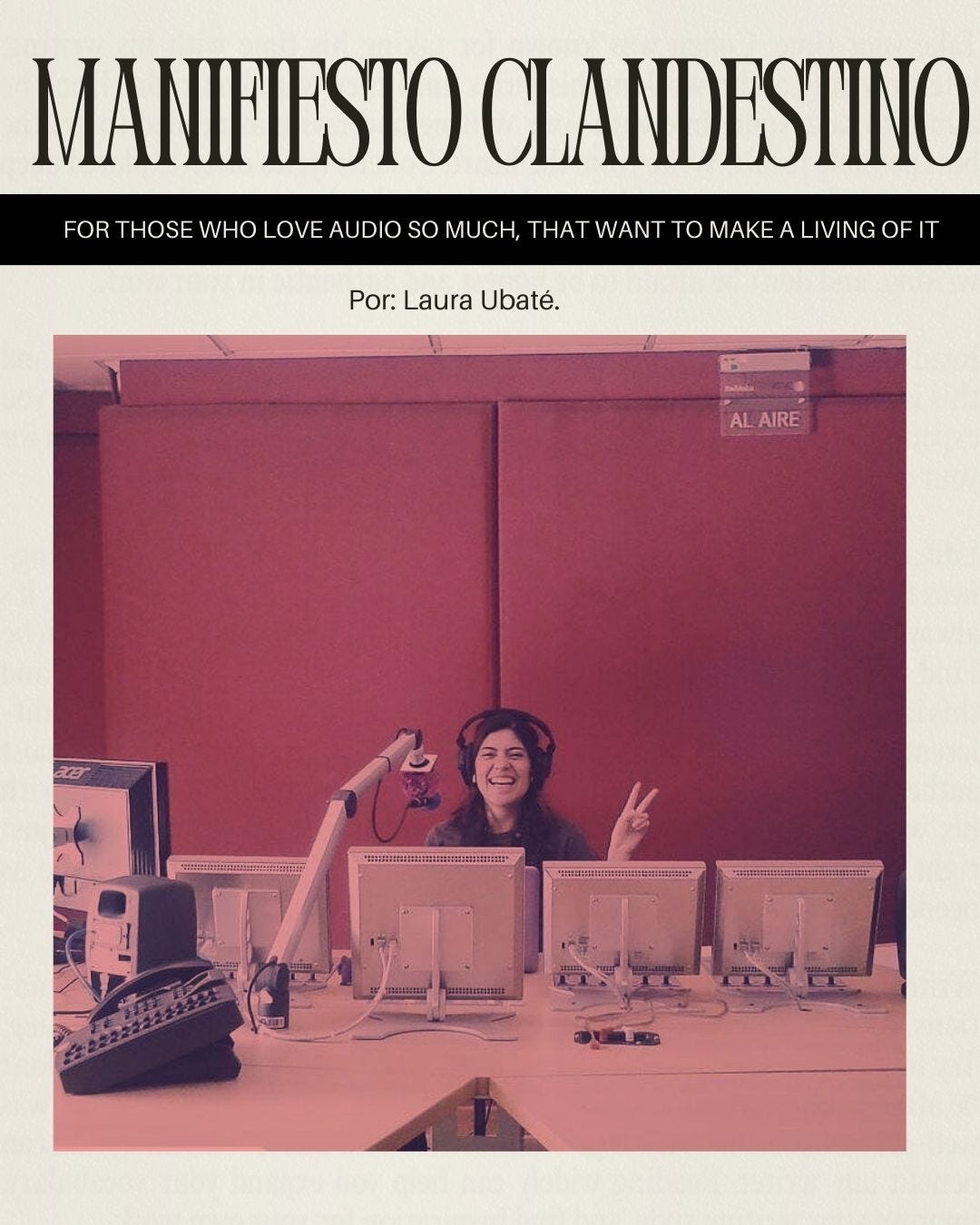Opinion: Clandestine Manifesto for the audio lovers.
Clandestine manifesto for the recognition and dignity of loving audio so much that we want to make a living out of it.
Buen día
This is a clandestine manifesto. Reading it out loud is recommended.
We audio nerds are discriminated against.
Every International Radio Day, we are cast aside because our pieces are too experimental, too abstract, and above all too long and “weird” to be on air ("6 minutes long?"... "What do you think you are? Metallica's 'Nothing Else Matters'?" ). Radio señoros shush us, like a puppy, sending us to better make it a podcast because what we do is not for radio, better let the music sound, better let the news air on time, maybe next time... perhaps on a holiday, then we might have a spot to broadcast. Rubbish.
To the psalm, they respond: radio accompanies, entertains, and informs. Enough!
During International Podcast Day we also are set under the radar. Nobody gives us chocolates as they gift on teachers’ day, nor do we get celebrated in Twitter trends, nor do Community Managers make a post about us, nor do we get a message or a call. We like audio and that's why we don't go on camera. And when it’s Podcast Day, those who do go on camera are congratulated, but in a TikTok version where you can see your headphones and microphone well. Not to those who prepared the content, not to those who do all the postproduction. Happy podcasting day only to the ones on camera.
Despite our cautious attempts to explain that we like audio, just audio, the tyranny of the screen continues to demand to be seen, to be noticed, and to be shared. We are asked to offer our audios like selling empanadas. We are set aside against, yes, because sometimes we are told "It's just that your voice doesn't sound like how you look" and we can't bear to ask why. We are pushed aside when it comes to fame but we are required, every day. We are canceled, because we don't follow the latest marketing trends but are ignored when we ask for more time, resources, and improvements to get the word out about our work. We are asked to produce, write, edit, design, mix, and do our best to keep costs down. We are creatures who don't like appearances but enjoy every minute of our magic: the invisible art of shaping audio.
In the radio booths. Hours after the radio personality left, we are cutting tape and making loops of the 30 seconds where a laugh sounds cockatoo, a meme and a beat. We mix it, export it, put it in a folder, and then send it to a Whatsapp chat, perfectly at peace that our work will never be heard.
In the recording studios. We send the last_last_email with the last_last_this_is_the_last_delivery on a Friday night and then we put away the keyboard and open the tray. We load the discs, test the songs, adjust the beats per minute, and thunder. We shuffle audio, fast forward time, dress it up with layers, filter it, dance, and do it all over again until someone comes in to tell us to please turn it down, it's time to go home.
Alone, in our homes. We massage our crowns to release the pain after hours and hours of wearing headphones, with the resignation that the next day we will listen to what we did and we will always want to do something else to make it sound better.
In the minutes of waiting before the video call starts recording. We ask for "elevator music" because it amuses us and after hanging up, we send each other songs and movie scenes. We write to each other in chats to be read aloud and send each other voice messages when necessary and when not necessary as well.
This is a call for unity. So that the next time a crackling song with high compressions is played on the bus, the entire citizenry exclaim "This song is horrendous " and run in flocks to listen to it in high fidelity, where the fruit of our long hours of work is. A united clamor. So that when anyone listens to yet another podcast with a guest that sounds like it's inside a cavern, they will stop, for us, listening and write "What an awful recording, hire a good audio team" in the comments section. "Please fact-check your opinions" is desirable as well.
We call for cooperation. So that every influencer who says they do podcasts also knows how many hours we spend editing the conversation they just recorded. And for them to really listen to their own episodes.
We urge every production company, every platform, and every podcast to add our names to the credits of every episode. We ask to be hired for our talents, not our skin color, our friendships, or our number of followers.
We call for universities to analyze our work and for newsrooms to defend the craft of experimenting with audio as the only way we will do more and more justice to stories and more and more emotional connection with those who listen to us.
We urge for more technological development in our language. For algorithms to highlight our work and for the rules for promoting our content to be transparent. We need access to monetization and more partnerships with other industries so that working in audio is a possible and dignified profession.
This manifesto is on behalf of all independent audio creators, who created before anyone financed, who published before anyone authorized, and who continue to sponsor with their enthusiasm what the headlines call "the boom of podcasting in Spanish".
To you: Happy International Audio Love Day. Happy International Podcast Day.
Bogotá, September 30, 2023.
Laura Ubaté González,
Attach signatures from social networks, comments and forums. #Amorporelaudio.








Love this! The audio professions were born before the video professions, and yet why are they so undervalued compared to the latter's?